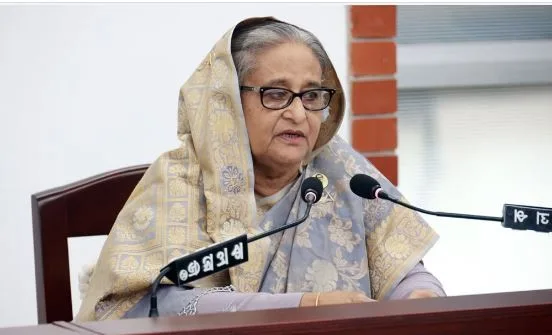DHAKA, July 2: In a dramatic turn of events in Bangladesh’s ongoing political crisis, former Prime Minister Sheikh Hasina was on Wednesday sentenced to six months in prison by the International Crimes Tribunal (ICT) on charges of contempt of court. The verdict, passed by a three-member bench led by ICT Chairman Justice Golam Mortuza Majumdar, also handed a two-month jail term to Shakil Akanda Bulbul, a student leader from the Awami League’s youth wing, Chhatra League, in the same case.
The tribunal’s decision stems from a viral audio recording circulated on social media, allegedly featuring Sheikh Hasina making derogatory remarks and issuing threats against the tribunal, interpreted as attempts to interfere in judicial proceedings. The ICT had earlier served show-cause notices to both Hasina and Bulbul last month.
Sheikh Hasina, who led Bangladesh for over a decade until her ouster in August 2024, has been in self-imposed exile in India since August 5. Her sentencing marks a rare and controversial moment in Bangladesh’s judicial history, as critics and political observers widely view the move as part of an escalating campaign of political persecution against the former premier.
The Awami League swiftly condemned the verdict, calling it a “show trial” driven by political vendetta under the “unelected and undemocratic” interim regime of Muhammad Yunus. In a strongly worded statement, the party accused the current administration of undermining judicial neutrality and weaponizing legal institutions to target political rivals.
“This cannot and would not be a fair trial in any jurisdiction,” the party declared, citing concerns previously raised by the United Nations over due process violations and bias within the ICT. The Awami League further alleged that since taking power, the Yunus-led interim government has disproportionately targeted Awami League leaders while failing to act on serious human rights violations against civilians, minorities, journalists, and women.
In a historical irony, the International Crimes Tribunal that passed the verdict was originally established by Hasina’s own government under the International Crimes (Tribunals) Act to prosecute war crimes committed during Bangladesh’s 1971 Liberation War. Today’s ruling, critics say, illustrates how that same institution is now being used against its founder.
Analysts see the case as part of a broader crackdown on pro-democracy voices since Hasina’s fall from power. Since August 2024, numerous criminal cases have been lodged against her allies, raising fears of a shrinking democratic space in Bangladesh.
Once hailed as the torchbearer of democratic restoration and daughter of Bangladesh’s founding father Sheikh Mujibur Rahman, Hasina now faces a prison sentence in absentia — a symbolic and sobering reflection of the shifting political tides in the country.

